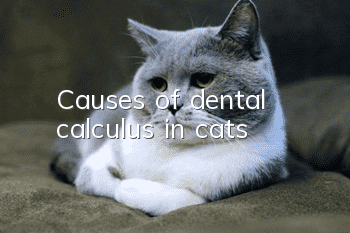Causes of dental calculus in cats

Cat calculus is mainly caused by not brushing the cat’s teeth regularly and improper diet. For example, the cat often eats soft or high-salt food. In addition, oral inflammation caused by a weakened immune system or natural misalignment and uneven teeth can also cause cats to suffer from dental calculus. The owner can open the cat's mouth, and you can clearly see some yellow-brown stones on the side walls of the cat's teeth. At this time, you need to take the cat to the pet hospital for ultrasonic teeth cleaning as soon as possible, and pay attention to maintaining the cat's oral hygiene, and give the cat regular brush teeth.
1. Failure to brush the cat’s teeth regularly
After the cat eats food, food residue will remain in the gaps between the teeth. If the cat’s teeth are not brushed in time, more and more will accumulate in the long term, and slowly Plaque is formed on the teeth, and when there is too much plaque, calculus is formed. Therefore, it is best for owners to develop the habit of brushing their cats’ teeth regularly from an early age.
2. Improper diet
If the owner feeds the cat some liquid food and soft food that are easy to adhere to the teeth for a long time, such as rice, canned food, Miaoxianbao, and boiled meat After a long time, these food residues and saliva combine to form dental calculus. In the early stage, these dental calculus and dental plaque are relatively delicate and can be removed with fingers dipped in gauze. However, over time, they will slowly calcify and form stronger dental calculus. Therefore, it is recommended that owners use dry cat food as their cat's daily staple food. The shape of cat food helps cats clean their teeth when chewing and remove tartar and plaque through friction.
3. Oral inflammation caused by a weakened immune system
Cats are more likely to develop oral mucosal inflammation after suffering from feline leukemia or feline immunodeficiency virus. This is because when a cat’s immune system is compromised and its immunity is not strong enough to fight inflammation, harmful bacteria will multiply and be deposited on the cat’s teeth, forming dental calculus. In this case, you need to take the cat to the pet hospital for examination and treatment in time.
4. Born with misaligned and uneven teeth
Because the upper, lower jaws and noses of Persian cats and British Shorthair cats are naturally shorter, it is difficult for their teeth to get enough space in the jawbone. Due to the space, misaligned and crooked teeth often occur, which also makes these cats more susceptible to dental calculus, gingivitis and other oral diseases.
- Prevention and precautions for nasal branch in cats
- What causes cats to drool?
- How to train a kitten to use cat litter?
- Why do cats love to smell their feet?
- Why do Ragdoll cats stop eating cat food? How do novices raise Ragdoll cats?
- Can cats from a litter mate?
- What should I do if my cat doesn’t sleep at night and barks randomly? Help you deal with night owls!
- What does a cat’s stress response look like? What should we do if it occurs?
- How long can a cat live? Cat lifespan!
- Why do cats fight? What’s the reason?



